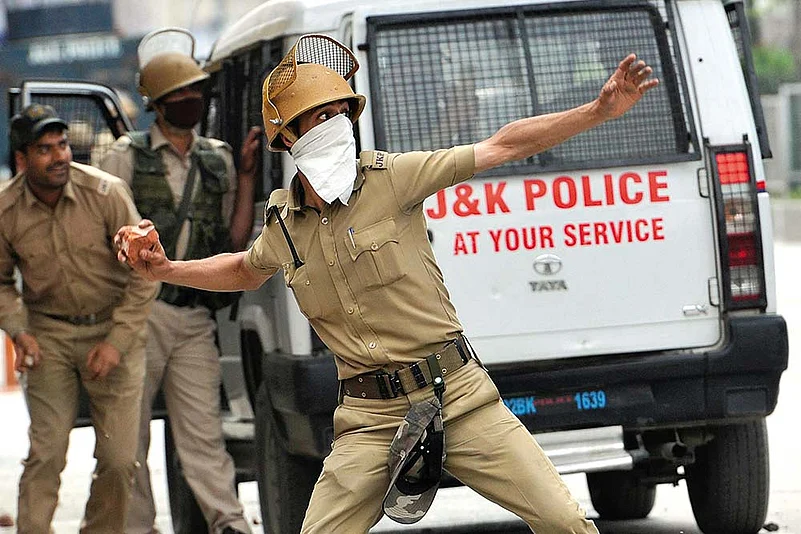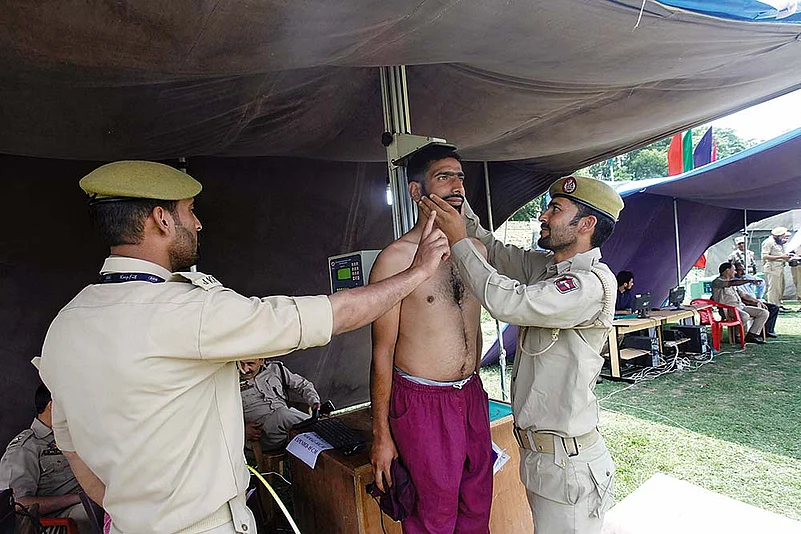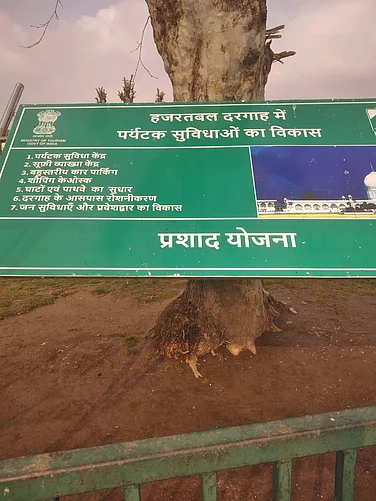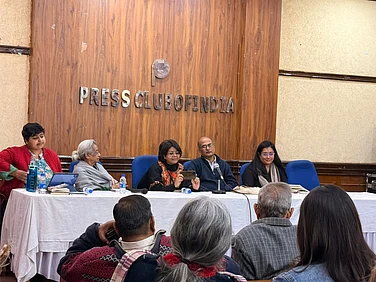“Officers of the Jammu and Kashmir Police should get the grade and the position, but not the rank. A difference must be maintained between officers of the Indian Police Service (IPS) and the J&K Police Service (JKPS),” says Ashok Kaul, BJP’s general secretary (organisation) in J&K. “The services would be doomed if JKPS officers became IGPs without induction into the IPS.” That’s the crux of the rift caused within Jammu and Kashmir’s ruling PDP-BJP coalition over the creation of a separate cadre service—with enhanced promotion avenues—for “direct-recruit” officers of the 1.2-lakh-strong J&K Police. When the home department’s proposal was approved by a cabinet sub-committee last week, it was evident the BJP’s will had prevailed over the home department’s original proposal.
The proposal that the home department had come up with last year envisaged a Kashmir Police Service (KPS) whose officers could be promoted to DIG and IGP ranks irrespective of whether they are inducted into the IPS. This would be on the lines of the Kashmir Administrative Service (KAS), whose officers are appointed as administrative secretary, a post equivalent to IGP in terms of the pay grades.
Recruitment to the KAS is made through the Jammu and Kashmir Public Service Commission (PSC), which was established in 1957 with Major General Yadev Nath Singh as its first chairman. The PSC selects the direct recruits through the J&K Combined Services Competitive Examination. The first batch of KAS officers were recruited in 1972, the second in 1977 and the third in 1984. Since 1999, the exams have been held regularly. Police officers selected through this process have been demanding promotions, grades and a separate state cadre service like their counterparts in KAS. In fact, the direct-recruit police officials have been calling themselves KPS officers already.
A former police officer, who joined the department in 1984 as a direct recruit at the same time as an IPS officer, says, “Despite a good service record, I retired as SSP and the IPS officer retired as DGP. We thought this government would rectify the wrong.” He was among those who were disappointed last December, when the state’s BJP ministers opposed the home department’s proposal in a cabinet meeting. CM Mehbooba Mufti left that meeting in a huff. The proposal was later referred to a sub-committee, which eventually approved it with modifications and called for the creation of the JKPS.
The modifications meant that only four DIG posts (in charge of home guards, vigilance and civil defence) and two IGP posts (civil-military liaison and human rights) would be open to officers not inducted into the IPS. “The officers on promotion shall not be designated as DIGs and IGPs, respectively,” the order reads. “They shall be posted only against the posts identified in the proposal and with different designation. They shall not be posted against any other cadre posts of IPS.”

Cop faces stone-pelters
The state’s police officers had sought that direct recruits posted as DySP should be promoted to selection-grade DySP after five years, then to SP after another five years, and after five more years, to SSP. This has not been accepted, as promotions and grades remain subject to vacancies. Many officers are calling this “gross injustice”.
“I think the government doesn’t trust the police,” says a senior police officer. “Last year, after the lathicharge inside the National Institute of Technology (NIT) campus in Srinagar, no one objected when we were described as terrorists. This year, we have been denied promotions and grades for no reason at all.” Another officer quips, “We are seen as suspects who cannot be trusted as IGP of Kashmir or Jammu.”
On April 4 last year, when the J&K Police resorted to a lathicharge on 500-odd non-local students of NIT who wanted to take out a procession outside the campus, the central government intervened and the police were removed from the campus. The students, who had previously hoisted the tricolour in the campus as a reaction to Kashmiri students celebrating India’s defeat in the T-20 World Cup, had accused police of highhandedness. BJP MP and former Panchajanya editor Tarun Vijay made an indirect reference to the police when he tweeted, “Absolutely no excuse. Protecting Tiranga students frm wolves state responsibility. Indians cant be traumatized in India for being patriotic.” Film-maker and CBFC member Ashok Pandit’s tweet was more direct: “We always said #J&K police are #terrorists in the police uniform. Their heart has always been with #Pakistan.” In the months since, militants have killed over 15 police personnel, but Pandit has not deleted his tweet.
In the aftermath of the NIT fracas, for the first time in the history of the INSurgency, J&K police officers expressed their anger and disappointment on social media. DySP Feroz Yehya posted on Facebook: “Many of my colleagues have been asking and many more must be thinking whose war are we fighting? All I can tell them is that, this is just another phase and will pass. Further JK Police doesn’t need any certificate from people like Mr Arnab Goswami….” Baramulla SSP Imtiyaz Hussain wrote, “100s of our colleagues in JKP hv gone bck 2 deir homes in coffins wrapped in #Tiranga fighting to uphold it’s honour. Stand with #JKP #NIT.”
Similar sentiments have surfaced once again. “It is for the sake of the country that we have fired at others and have also been hit by bullets. We shouldn’t be denied our grade and promotions,” says a senior police officer. Since 1990, over 1,500 policemen have been killed in J&K, including a DIG, 20 DySPs, 23 inspectors and 34 sub-inspectors. The police have not just played a vital role in maintaining law and order, but their elite formation, the Special Operation Group (SOG), was also singlehandedly responsible for bringing down the number of militants from thousands in 1996-97 to 200 at present. Founded in 1994 as a counter-insurgency force comprising local policemen, the SOG helped in somewhat closing the gap in intelligence-gathering faced by the army and the BSF, which comprise mostly non-locals. Soon the SOG came to be seen as a “dreaded force” in the Valley. In December 1999, militants attacked its headquarters, killing 14 policemen, including a DySP.
Some former SOG chiefs are miffed with the government order, saying it “looks like the SOG is unworthy of promotions and grades.” “We are not saying we should be given special benefits for our professional work of counter-insurgency or law and order. We will do it anyway. We are saying, give us our due,” says a retired police official known for his role in counter-insurgency operations.
According to PDP insiders, had the BJP accepted the original proposal, it would have helped strengthen the police force, which will have to gradually take over law-and-order duties from the paramilitary forces and army. Since Sheikh Abdullah’s time, successive J&K governments have tried to promote local officers in administrative and the police posts. In fact, both National Conference (NC) and the PDP have long been advocating the appointment of local police officers in sensitive posts. In 1984, the then NC government had come up with a proposal to ensure equal opportunities for state police officers, but it didn’t move forward. In January 2011, the then CM Omar Abdullah had said, “It is a constant endeavour of the state government, supported by the Centre, that more and more responsibility is transferred to the J&K Police. Gradually, we will reduce the role of the army and central paramilitary forces, particularly in urban areas. This is an ongoing process and it will continue.”
In September 2015, Abdullah’s successor as CM, Mufti Mohammad Sayeed, told army officers in Srinagar that the army’s “role in internal security of J&K is almost over” and they “need to focus on the borders”. That is why many in the J&K Police are surprised by the BJP’s decision not to fully support the state home department’s proposal about promotion and grades of JKPS officers. The home department, incidentally, is headed by CM Mehbooba Mufti.
PDP insiders say their party has been striving to create “a unique system in Jammu and Kashmir, under the larger nationwide system”. This time, they say, the PDP tried to take the BJP along, but the latter saw the move to have a separate state cadre service for the police as an assertion of autonomy by a regional party. Being a party that believes in the “full integration” of J&K in the Indian Union, the BJP opposed it.
BJP spokesman Sunil Sethi, however, says his party is on the same page with the PDP on the issue of sensitive field postings being given to officers only after they are inducted into the IPS. “You have to make a distinction between the sensitive field postings and other postings,” says Sethi.
Government spokesman and senior PDP leader Naeem Akhtar calls the creation of a separate state cadre service for the police a “revolutionary step”. “We have reached one important benchmark. We can go further. Who is stopping us? It will evolve with the time. A good foundation has been laid because the J&K Police is a distinctive force, which has to fight on many fronts, generally in very adverse circumstances. That is why the CM took the lead in this and I believe it is a revolutionary beginning. The stagnation that was harming the individual officer’s interest and the morale of the force has now been beaten,” Akhtar says.
Pointing out that there has been no induction of J&K officers into the IPS since 2008, Naeem says, “We are trying to clear cases about seniority that are pending in court and holding up around 50 slots in the IPS. Once that is done, there will be a better field for the state.”
By Naseer Ganai in Srinagar


























